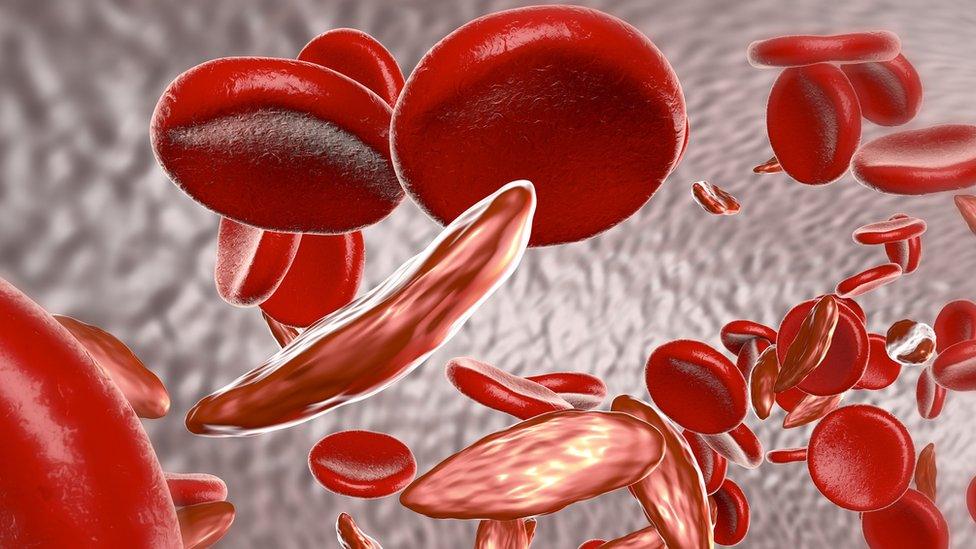World Sickle Cell Day 2023: What is sickle cell disease?
- Published
- comments

Sickle cell disease is when your body makes unusually shaped red blood cells. Red blood cells should be round, but sickle shaped cells are crescent shaped.
World Sickle Cell Day is held on 19 June each year.
The day aims to raise awareness of sickle cell nationally and internationally.
In 2008 the United Nations General Assembly recognised that sickle cell disease as a public health problem and called for members to raise awareness of the disease on World Sickle Cell Day.
About 15,000 people in the UK have sickle cell disorder and almost 300 babies each year are born with the disease in the UK.
Sickle cell is an invisible condition, which means that you might not know that somebody has it just by looking at them.
Invisible Conditions: Don't say that to us
What is sickle cell?
Sickle cell disease is the name for a group of inherited health conditions that affect the red blood cells.
If you have sickle cell disease your body makes unusually shaped red blood cells. This can cause problems because they do not live as long as healthy blood cells and can block blood vessels.
Sickle cell disease is serious and you will have it your whole life, but having treatment may help ease some of the symptoms.
Anyone can be a carrier of sickle cell, but it's much more common in people from certain ethnic backgrounds.
In the UK, most people who carry the sickle cell trait have an African or Caribbean family background.
Sickle cell crisis or painful episodes - this is when the blood vessels become blocked and this causes severe pain. The pain can last up to seven days on average. These can happen every few weeks for some people while others may have less than one a year.
Infections - Those with sickle cell are more vulnerable to injections, especially when they are young.
Anaemia - Most people with sickle cell disease have anaemia. This is where your haemoglobin, the substance found in red blood cells which is used to transport oxygen around the body, is low. It can make you feel really tired
Other symptoms include: delayed growth in childhood, bone and joint pain, tummy pain, kidney or urinary problems and high blood pressure.
Source: NHS
How do you get sickle cell?
Sickle cell disease is caused by inheriting the sickle cell gene.
It is not caused by anything parents did before or during the pregnancy and you can not catch it from someone who has it.
How do you treat sickle cell?
If you have sickle cell you will have treatment all your life.
Children and adults with the disease will be supported by a team of different healthcare professionals at a specialist sickle cell centre.
There is medicine to help with a sickle cell crisis or painful episode, which is when you experience a severe amount of pain.
Doctors also advise you to drink plenty of water, use a warm towel to massage the areas in pain and try to distract yourself like watching a film if you are going through a painful episode.
Children with sickle cell are also advised to have all their routine vaccinations because they are more vulnerable to infections.
Another possible treatment is stem cell or bone marrow transplants. Stem cells are special cells made by bone marrow. Bone marrow is a spongy tissue found in the centre of some bones.
Stem cell transplant is when stem cells from a healthy donor are given through a drip into a vein. These cells then produce healthy red blood cells to replace the sickle cells.
However these treatments are only considered in children who have severe symptoms.
What is it like having sickle cell?
12-year-old sickle cell disease patient Samuel Price took part in a roundtable on sickle cell disease at the White House in Washington, DC in 2020
Those who have sickle cell can live a full life but also have to look after themselves.
There are many treatments that help to manage the condition so they can live with the disease, but they can also experience severe pain, experience increased risk of infections and other symptoms.
The NHS say there are many things you can do to stay as healthy as possible if you have sickle cell disease.
To avoid trigger painful episodes or sickle cell crisis you should try to:
drink plenty of water
avoid extreme temperatures
avoid hard experience
relax
If you have sickle cell you should also know when to get medical advice. Look out for signs such as high temperature, severe dizziness, sudden swelling in the tummy and breathing difficulties and speak to your GP, healthcare team or go to hospital.
- Published29 March 2018
